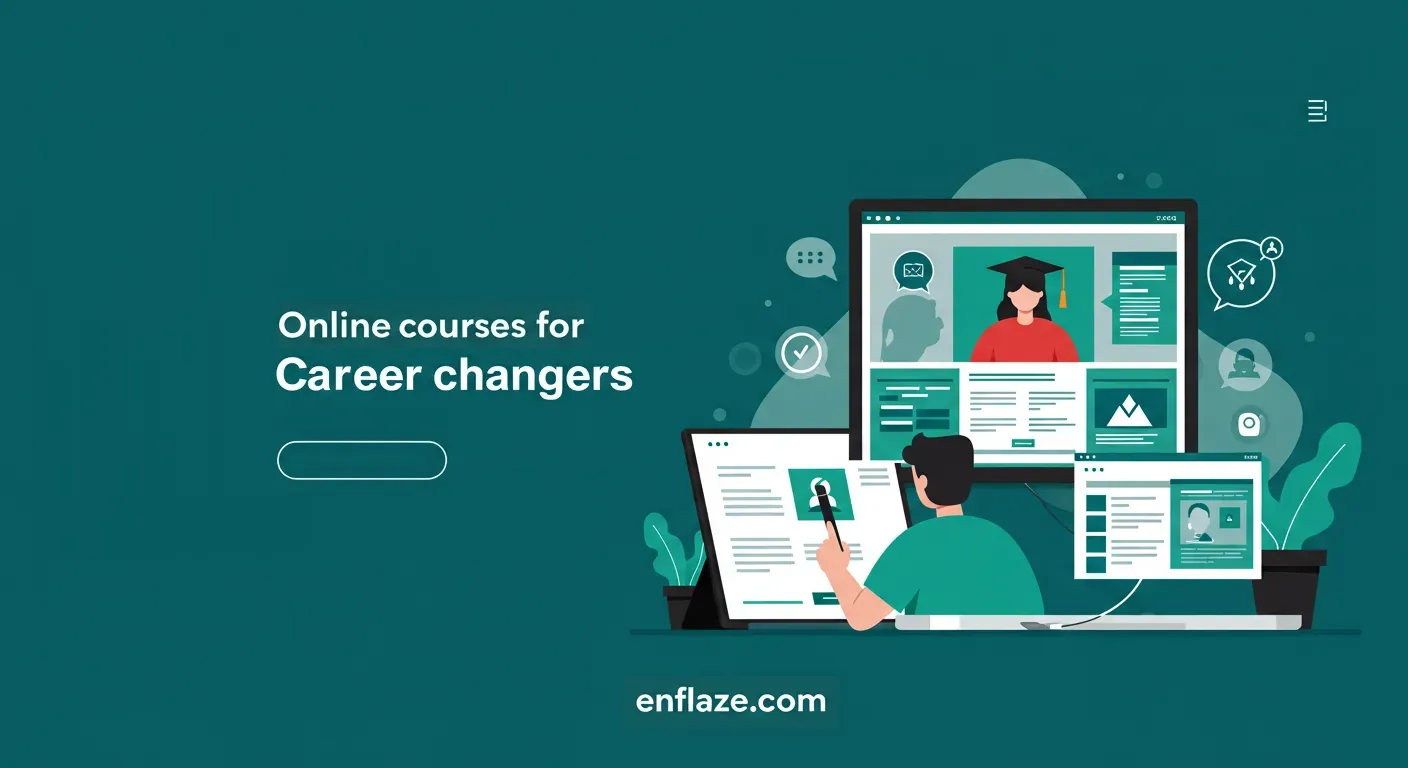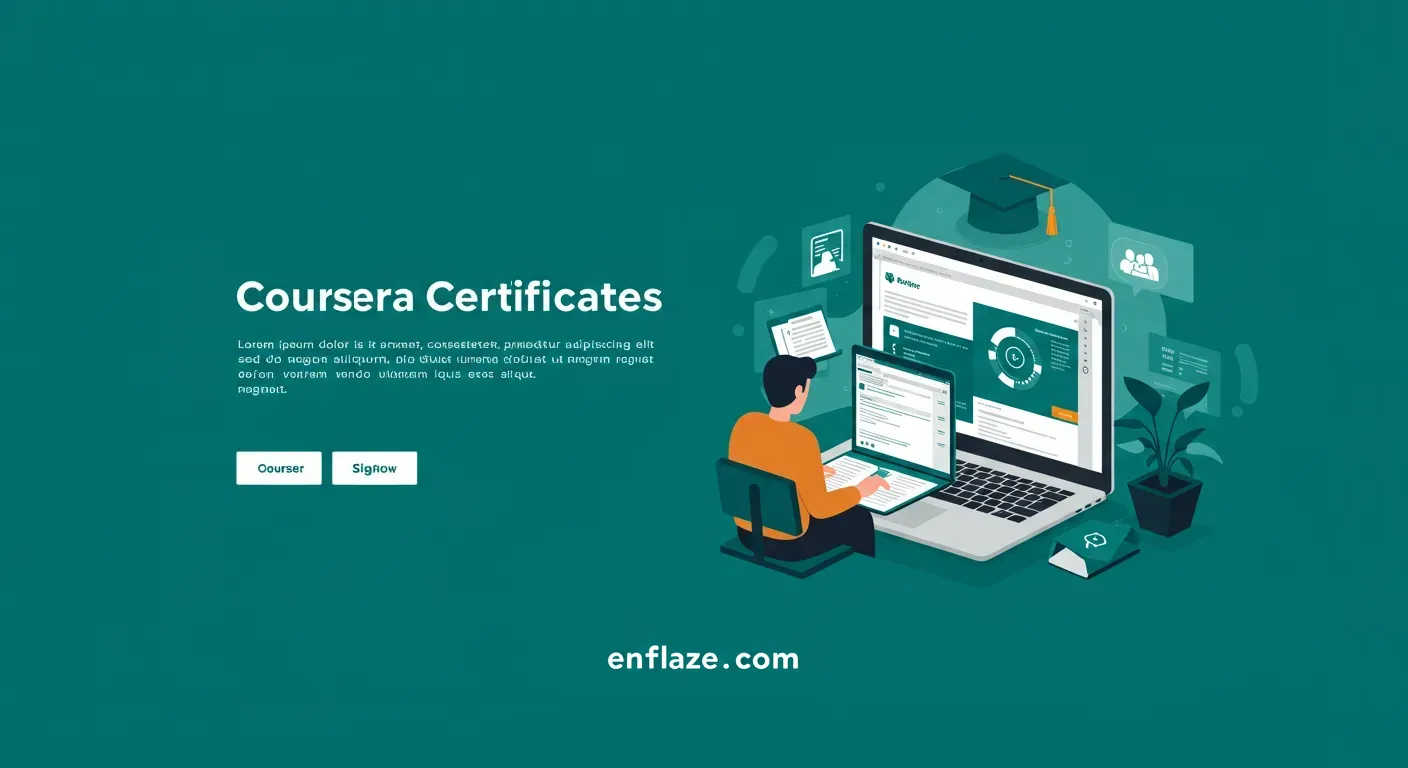Did you know the average person changes careers 5-7 times during their working life? (Source) If you’re feeling stuck, unfulfilled, or simply ready for a new challenge, you’re not alone. Many people are reassessing their professional paths and seeking more meaningful and rewarding work. While a career change can feel daunting, with concerns about a skills gap, financial stability, and the general uncertainty of starting anew, it’s absolutely achievable.
One of the most effective and accessible ways to bridge that gap and launch into a new field is through online courses. These programs offer flexible, often affordable, ways to gain in-demand skills, earn recognized certifications, and boost your confidence.
Enflaze.com is here to help you navigate the vast world of online learning, providing resources and reviews to help you discover and choose the best courses for career changers.
In this article, we’ll explore why a career change might be right for you. We’ll guide you through self-assessment, and highlight top course categories to consider.
Signs It’s Time for a New Direction
Many factors can signal that it’s time to consider a career transition. Are you experiencing persistent burnout and job dissatisfaction? Do you feel a lack of growth opportunities or sense that your current role doesn’t align with your values? Maybe you are craving a job that sparks passion. Other common reasons include:
- A desire for a more fulfilling or meaningful career.
- Changes in personal interests or priorities.
- Industry shifts or disruptions that threaten job security.
- Seeking a better work-life balance or higher earning potential.
- Changes to your financial situation, or a desire for more financial stability and growth.
Benefits of Making the Leap
While change can be scary, the rewards of a successful career change are often well worth the effort. These can include:
- Increased job satisfaction and engagement in your daily work.
- New opportunities for learning, skills development, and professional growth.
- Potential for higher income or improved benefits packages.
- A greater sense of purpose and fulfillment in your chosen field.
- Improved mental and physical well-being, stemming from reduced stress and increased happiness.
Before You Enroll: Identify Your Strengths and Passions
Choosing the right course starts with understanding yourself. Before diving into the vast sea of online education, take some time for self-reflection. This will help you identify areas where your current skills can transfer and pinpoint new fields that genuinely excite you.
Tools and Techniques for Self-Assessment:
- Skills Inventory: Make a list of your existing hard skills (e.g., software proficiency, data analysis, project management). Also consider soft skills (e.g., communication, teamwork, problem-solving).
- Interest Assessments: Online quizzes and career aptitude tests can help you identify potential career paths that align with your interests. A great resource for this is MyNextMove, sponsored by the U.S. Department of Labor.
- Values Clarification: Determine what’s truly important to you in a career. Do you value creativity, autonomy, helping others, intellectual stimulation, or financial security?
- Informational Interviews: Reach out to people working in fields that intrigue you. Ask them about their career paths, daily tasks, and the challenges and rewards of their work. LinkedIn is an invaluable tool for finding professionals in various industries.
- Enflaze Connection: Utilize Enflaze.com’s resources, such as our insightful blog articles and career quizzes, to help you through this self-discovery phase.
Top Course Categories to Consider This Year
1. Technology & IT
The tech industry continues to boom, offering high demand, competitive salaries, and often the flexibility of remote work.
Course Examples:
- Web Development:
- “The Complete Web Developer Bootcamp” (Udemy) – A comprehensive course covering HTML, CSS, JavaScript, Node.js, and more, ideal for aspiring full-stack developers.
- “Front-End Web Developer Nanodegree” (Udacity) – A project-based program for those seeking to become front-end developers, focusing on creating interactive and user-friendly websites.
- Data Science/Analytics:
- “IBM Data Science Professional Certificate” (Coursera) – This program provides a foundational understanding of data science tools and methodologies, including Python, SQL, and machine learning.
- “Data Analyst Nanodegree” (Udacity) – Learn to gather, clean, analyze data, and create compelling data visualizations using tools like Python, SQL, and Tableau.
- Cybersecurity:
- “Google Cybersecurity Professional Certificate” (Coursera) – This certificate provides entry-level skills for cybersecurity roles, covering topics like network security, risk management, and Python for security.
- Cloud Computing:
- “AWS Certified Cloud Practitioner” (Amazon/Various) – Learn the fundamentals of Amazon Web Services (AWS), a leading cloud platform, opening doors to various cloud-related roles.
- UX/UI Design:
- “Google UX Design Professional Certificate” (Coursera) – This program teaches user-centered design principles, user research, wireframing, prototyping, and usability testing.
2. Business & Management
Business and management skills are highly transferable across industries and can pave the way for leadership roles.
Course Examples:
- Project Management:
- “Google Project Management Professional Certificate” (Coursera) – This certificate covers traditional and agile project management methodologies, equipping you with skills to lead projects effectively.
- “PMP Certification Exam Prep” (Various) – Numerous providers offer courses to prepare you for the Project Management Professional (PMP) certification, a globally recognized credential.
- Digital Marketing:
- “Digital Marketing Nanodegree” (Udacity) – Learn in-demand digital marketing skills like SEO, social media marketing, email marketing, content marketing, and paid advertising.
- “Become a Digital Marketer” (Udemy) – Explore a range of digital marketing courses on udemy for topics like SEO, social media, paid ads, email marketing and more.
- Business Analytics:
- “Business Analytics Specialization” (Coursera) – Develop your ability to use data for business decision-making, covering topics like data modeling, data visualization, and statistical analysis.
- Financial Management:
- “Financial Markets” (Coursera – Yale University) – Gain a strong foundation in financial markets, including stocks, bonds, and other investment instruments, taught by Nobel Prize winner Robert Shiller.
3. Creative & Design
If you have a passion for creativity and artistic expression, a career in design might be the perfect fit.
Course Examples:
- Graphic Design:
- “Graphic Design Masterclass” (Udemy) – Learn the fundamentals of graphic design, including design principles, typography, color theory, and software like Adobe Photoshop and Illustrator.
- “Graphic Design Specialization” (Coursera – CalArts) – This specialization offers a more in-depth exploration of graphic design, including branding, interface design, and motion graphics.
- Photography:
- “Complete Photography: Beginner to Expert” (Udemy) – Master the art of photography, from basic camera settings to advanced editing techniques using software like Adobe Lightroom.
- Creative Writing:
- “Creative Writing: The Craft of Plot” (Coursera – Wesleyan University) – Develop your creative writing skills, focusing on crafting compelling narratives and engaging plots.
- Video Editing:
- “Adobe Premiere Pro CC Masterclass” (Udemy) – Learn to edit videos professionally using Adobe Premiere Pro, a widely used industry-standard software.
4. Healthcare & Wellness
The healthcare industry is experiencing significant growth, creating numerous opportunities for those seeking to help others and make a positive impact.
Course Examples:
- Medical Coding & Billing:
- “Medical Billing and Coding Certification” (Various) – Organizations like the AAPC offer training and certification programs for aspiring medical coders and billers, who play a crucial role in healthcare administration.
- Health Informatics:
- “Health Informatics Specialization” (Coursera – Johns Hopkins) – This specialization explores the intersection of healthcare and technology, focusing on the management and analysis of health data.
- Nutrition:
- “Introduction to Nutrition and Food Safety” (Coursera) – Gain a foundational understanding of nutrition science, dietary guidelines, and food safety principles.
- Mindfulness & Meditation:
- “Mindfulness for Wellbeing and Peak Performance” (FutureLearn) – Learn mindfulness techniques to improve well-being and enhance performance, opening potential paths to become a mindfulness coach or instructor.
5. Education & Training
If you have a passion for teaching, mentoring, or sharing your knowledge, a career in education can be incredibly rewarding.
Course Examples:
- Teaching English as a Foreign Language (TEFL):
- “TEFL Certification” (Various) – Numerous organizations offer TEFL certification courses, preparing you to teach English to non-native speakers around the world.
- Instructional Design:
- “Instructional Design Foundations and Applications” (Coursera) – Learn the principles of instructional design to create effective and engaging learning experiences for various audiences and settings.
- Online Course Creation:
- “How to Create an Online Course” (Udemy) – Learn how to develop and launch your own successful online courses, sharing your expertise with a global audience.
Choosing the Right Course for You
With so many online courses available, choosing the right one can feel overwhelming. Here are some key factors to consider:
Factors to Consider:
- Learning Style: Do you prefer self-paced learning, live instructor-led sessions, or project-based learning? Different platforms cater to different learning styles. Coursera and edX often offer structured, university-affiliated courses, while Udemy and Skillshare provide more flexible, self-paced options.
- Time Commitment: How many hours per week can you realistically dedicate to your studies? Be honest about your availability to avoid burnout.
- Budget: Course fees can vary significantly. Consider the cost of the course, any required software or materials, and potential lost income while you’re studying.
- Course Format: Do you prefer a fully online course, or would you benefit from in-person or hybrid options?
- Accreditation and Certification: Does the course offer a recognized certification or accreditation that will be valued by employers in your target field?
- Instructor Expertise and Support: Research the instructor’s qualifications and experience. Look for courses that provide adequate support, such as Q&A forums, access to teaching assistants, or one-on-one mentoring.
- Reviews and Testimonials: Read reviews from other students to get a sense of the course quality, instructor effectiveness, and overall learning experience.
- Enflaze Insights: Enflaze.com makes it easy to discover online courses based on these factors. Read our detailed guides to find the perfect match for your needs and goals.
Staying Motivated and Succeeding in Your Course
Online learning requires discipline and self-motivation. Here are some tips to help you stay on track and achieve your goals:
Tips for Success:
- Set Realistic Goals: Break down the course into smaller, manageable milestones.
- Create a Dedicated Study Space: Find a quiet, distraction-free environment where you can focus on your studies.
- Develop a Study Schedule: Allocate specific time slots for studying each week and stick to your schedule as much as possible.
- Engage with the Course Material: Don’t just passively watch videos or read text. Take notes, complete assignments, participate in discussions, and ask questions.
- Connect with Other Learners: Join online forums, study groups, or social media groups related to your course to connect with fellow students.
- Stay Motivated: Regularly remind yourself of your career goals and why you’re taking the course. Celebrate your progress along the way.
- Seek Support When Needed: Don’t hesitate to reach out to the instructor, teaching assistants, or course support staff if you’re struggling with the material or need help.
Conclusion
Embarking on a career change can be one of the most rewarding decisions you make. By investing in your skills development through carefully chosen online courses, you can open doors to a more fulfilling, engaging, and potentially more lucrative career.
Remember to start with self-assessment, explore the diverse range of course categories available. Then choose a program that aligns with your learning style, time commitment, and budget.
Take the first step towards your dream career today!


